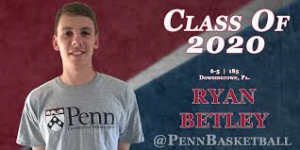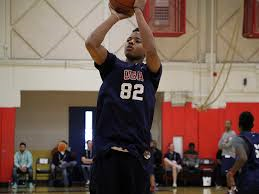Penn has had only had 1 winning season in the past decade so they are in dire need of some good recruits to help restore the program to its past glory. 1 of those incoming freshmen who hopes to make the Quaker alumni proud is Ryan Betley out of Downingtown West High School. He committed to Penn after his junior year, then finished his senior year by breaking his school’s record for career scoring. HoopsHD’s Jon Teitel got to chat with Ryan about why he chose Penn and what he knows about Coach Steve Donahue.
On Twitter you are listed as “Metta World Peace”: what made you choose that name? I was just hanging out with some friends and we were thinking about funny Twitter names: he was a tough guy on the court.
You were known for being a shooter at Downingtown West High School: what position did you play in high school, and what position do you think will be your best fit in college? I played SG in high school so I think that will be my best fit. I am 6’5” and can shoot, which allows me to be versatile on defense.
You finished your high school career with 1333 PTS, passing Eddie Barton as the all-time leading scorer in school history: what is the secret to being a great scorer, and do you think that anyone will ever break your record? I think that someone will eventually break my record. You have to be able to shoot the 3: it is an easy way to get a lot of points. It also helps if you can get to the rim and make free throws.
You were a 2-time team captain: what is the key to being a good leader? You need to be vocal in the locker room and competitive on the court. I tried to push my teammates to be better.
You received scholarship offers from several Ivy/Patriot schools: what made you pick Penn? It has great history and a great education: I want to study business and you cannot beat Wharton. I can also see myself fitting into their offense very well.
You announced that you were going to Penn in July of 2015: why did you make your decision so early in the recruiting process? I just wanted to trust my gut. I had liked Penn for a while and did not want to miss out by having someone commit before me. After evaluating some other schools I figured that my best option was to go to Penn.
What do you know about Coach Steve Donahue? I know that he is a Philly-area guy. I also know a lot of people who know him so he is a familiar face around here. He took Cornell to the Sweet 16 and coached at BC after starting his career as a JV coach at Penn.
Last month Coach Donahue announced the rest of your freshman class (AJ Brodeur/Devon Goodman/Ray Jerome/Zack Kaminsky/Jakub Mijakowski): which of them do you know the most about, and how much pressure is there on your class to turn things around for a program that has only had 1 winning season in the past decade? I played AAU ball with Devon so I am closest to him, but a couple of weeks ago I was on campus and got to see most of the other guys: the only 1 I have not met yet is Jakub. We got to hang out for a week, which was nice. I do not think there is pressure on our class: our whole team wants to win and we just want to make the team better and return to that winning tradition that the older alums are used to seeing.
You also played golf in high school: are we going to see you as a 2-sport athlete for the Quakers? I will be a 1-sport athlete.







Puppet Ramblings: The “Bathroom Law” Boycott Will Accomplish Nothing!
For starters, I don’t like it when sports, particularly college sports, are used as a political tool by political leaders who have nothing to do with sports. I obviously love college basketball, but I also love international soccer. If anything, it is refreshing to be able to not harp on your different political ideologies, but rather set them all aside and collectively enjoy something that belongs to all of us. This is definitely true with international soccer, but I feel that it is true for all levels of sport, including college basketball. Given the current climate of this country, we need more shared experiences, not less of them, and for better or worse, sport appears to be one of the vehicles where we can have a shared experience with people who have very different views and opinions, but during that experience feel like we are the same.
I need to say that we, as a staff, do not like to talk politics on Hoops HD. This is not a political site. Although we all have political opinions, we do not express them here or use this site as a vehicle for our own political ideologies. I am not writing this as an attempt to change or criticize anyone’s political viewpoints or opinions, but rather to criticize the methods New York Governor Andrew Cuomo has chosen to use in response to the HB2 laws (ie the Bathroom Laws) in North Carolina. More specifically, the impact those methods have on the college basketball programs in the state of New York (and Albany in particular), as well as college basketball as a whole.
This past March, Governor Cuomo issued an executive order banning all state sponsored non-essential travel to the state of North Carolina. He did this, presumably, because he felt that the HB2 laws were discriminatory toward the LBGTQ community and wanted to disassociate himself from that discrimination. Is this nothing more than disingenuous political posturing on his part?? I don’t know. Does he actually think this will be effective?? I don’t know. Did he ever consider how it was possibly unfair not just to the intercollegiate teams in the state of New York, but to the people in the state of North Carolina who strongly oppose the HB2 laws?? I don’t know. I don’t know what is in his heart or in his head, so I won’t even try and guess. I will say this, though….
This method is both unfair and ineffective. Albany was scheduled to open the upcoming college basketball season at Duke, and has now been made to back out of the game. The only people that are really directly impacted by this are the players and coaches on both teams, and none of them had anything to do with the HB2 laws. In addition to that, Duke is a private institution, so it is not tied to the state of North Carolina. Not only that, but as an institution Duke was strongly opposed to the HB2 laws. I fail to see how not allowing Albany’s basketball team to play at Duke, which is a private institution that opposes the HB2 laws, will do anything change the laws. If anything, I think that going there and playing the game would create an assembly of people where the vast majority of them also oppose the law, so in a way not going to play the game results in less opposition to the Bathroom Laws, not more of it.
STATEMENT FROM DUKE “DEPLORING IN THE STRONGEST POSSIBLE TERMS” THE HB2 LAWS
Taking this a step further, in addition to Duke being strongly opposed to the laws as you can read in the link above, it is my understanding the majority of the people in the state of North Carolina are opposed to the laws as well. So, what is accomplished by disassociating yourself with them?? What is accomplished by deciding not to engage them in an inclusive and shared experience such as a sporting event?? I understand not liking bigotry. I also feel that if you want to combat bigotry, then alienating people who are not bigots (which the vast majority of college students and student-athletes are not), but happen to live in a state with laws that you feel are bigoted, is not the way to go about it. Rock & Roll, Soul, and R&B acts that toured the Deep South during the Civil Rights Movement accomplished a lot more than they would have by boycotting those states. Seriously, if Governor Cuomo genuinely feels opposed to the HB2 laws and isn’t just doing this for political posturing, then why isn’t he ENCOURAGING the New York college teams to go to a place like Duke who is also openly opposed to them?? This boycott is unfair. This boycott is ineffective. And, to take it a step further, this boycott is arguably COUNTER-productive. How so?? Well….
We’ve seen sports boycotts before. The 1980 and 1984 Olympics comes to mind. I cannot think of a single example where a sports boycott had any sort of a meaningful impact. Not one. Now, having said that, I can think of multiple examples of where NOT boycotting had HUGE impacts. Jessie Owens did not boycott. Tommy Smith and John Carlos did not boycott. If you’ve ever seen the movie Invictus, Nelson Mandela seemed to do the exact opposite of a boycott. Like I said at the beginning, sports allow us to have shared experiences with people that are different than us, and during that event make us the same. In many cases, it may be the only time we feel that we are the same. Is that bad?? I sure as hell don’t think so. If anything, we need more of that, not less of it. You’re not going to change peoples’ hearts and minds by ignoring them. You have to engage them. You have to find common ground. And, sport IS common ground. It’s one of the few common grounds that we have. It is a shame that there aren’t more, but at least sports gives us something
So, Governor Cuomo, please, keep your political differences out of college sports. Do not be unfair to the individual student-athletes who played no political roll in the HB2 laws, and who probably disagree with the laws themselves. Do not deny people with different political viewpoints and ideologies the chance to have a shared experience with one another. Sports brings us together, and it will do more to make us better than it will to make us worse. This boycott will accomplish nothing.